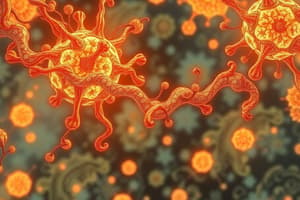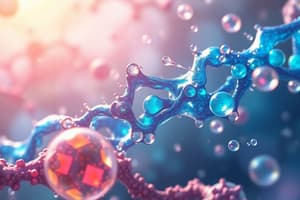Podcast
Questions and Answers
What is the main role of enzymes in living organisms?
What is the main role of enzymes in living organisms?
- Producing amino acids
- Lowering activation energy barriers
- Consuming substrates
- Speeding up chemical reactions (correct)
What is the purpose of the active site in enzymes?
What is the purpose of the active site in enzymes?
- To block substrate binding
- To store excess amino acids
- To interact with specific molecules (correct)
- To form unstable enzyme-substrate complexes
How do enzymes enhance essential cellular processes?
How do enzymes enhance essential cellular processes?
- By breaking down proteins
- By decreasing enzyme-substrate interactions
- By lowering activation energy barriers (correct)
- By increasing activation energy barriers
Which component can be found in addition to amino acids in some enzymes?
Which component can be found in addition to amino acids in some enzymes?
How can enzyme activity be regulated through allosteric regulation?
How can enzyme activity be regulated through allosteric regulation?
What happens when an effector binds to an enzyme's regulatory site?
What happens when an effector binds to an enzyme's regulatory site?
Which type of enzyme breaks down starches into sugars?
Which type of enzyme breaks down starches into sugars?
What is the role of helicases in DNA maintenance?
What is the role of helicases in DNA maintenance?
Which enzymes are involved in the production of signaling molecules that stimulate immune responses?
Which enzymes are involved in the production of signaling molecules that stimulate immune responses?
What is the function of proteases in the immune system response?
What is the function of proteases in the immune system response?
How do cofactor inhibitors affect enzyme activity?
How do cofactor inhibitors affect enzyme activity?
What is the main role of enzymes in metabolism?
What is the main role of enzymes in metabolism?
Study Notes
Enzymes: Catalysts of Life's Chemical Reactions
Enzymes are biological catalysts that play a crucial role in speeding up chemical reactions inside living organisms without being consumed themselves. They are proteins composed of amino acids, with some enzymes containing additional non-protein components called cofactors. Enzymes function by lowering activation energy barriers for specific chemical reactions, allowing them to occur more rapidly and efficiently. This enhances essential cellular processes such as digestion, metabolism, and protein synthesis.
Structure and Function of Enzymes
Enzymes consist of a distinct three-dimensional structure, often called the active site, which specifically interacts with certain molecules involved in substrate binding. The shape of this active site allows enzymes to bind to specific proteins, carbohydrates, lipids, and other molecules known as substrates, forming stable enzyme-substrate complexes. This interaction between the enzyme and its substrate facilitates catalysis, leading to the conversion of the substrate into products.
Regulation of Enzyme Activity
The regulation of enzyme activity involves controlling their rate of reaction and ensuring that they function efficiently within cells. Enzyme activity can be regulated through several mechanisms, including allosteric regulation, where a small molecule called an effector binds to an enzyme's regulatory site, altering its conformation and thus changing its activity. Another mechanism, cofactor inhibition, involves the binding of a cofactor that regulates the enzyme's ability to bind the substrate or interact with other factors.
Role of Enzymes in Important Biological Processes
Metabolism
Enzymes play a vital role in metabolism, the process of converting food into energy and other essential molecules. For example, digestive enzymes like amylase break down starches into sugars, while proteases split proteins into amino acids. Oxidative enzymes like cytochrome c oxidase convert molecular oxygen into water during cellular respiration, releasing energy stored in nutrient molecules.
DNA Repair and Maintenance
DNA repair enzymes help maintain genetic stability by fixing errors introduced during DNA replication or exposure to mutagens. Examples include helicases, which unwind double-stranded DNA, and methyltransferases, which add or remove methyl groups to modify DNA sequences. These enzymes ensure that the genetic information in genes is accurately copied during cell division, minimizing the risk of heritable genetic disorders.
Immune System Response
Immune system enzymes facilitate the body's defense against pathogens by activating immune cells and regulating inflammation. Enzymes like phospholipase A2 and cyclooxygenase are involved in the production of signaling molecules that stimulate immune responses, while proteases break down extracellular matrix proteins, facilitating immune cell migration and tissue remodeling.
Conclusion
Enzymes are indispensable components of life, driving essential chemical reactions and regulating various biological processes. Their structure and function are precisely tuned to ensure the efficient conversion of substrates into products, while their regulation mechanisms allow for fine-tuning of their activity within cells. Understanding the role of enzymes in biology has led to significant advancements in medicine, agriculture, and biotechnology, highlighting their importance in addressing global challenges and improving our quality of life.
Studying That Suits You
Use AI to generate personalized quizzes and flashcards to suit your learning preferences.
Description
Test your knowledge about enzymes, the biological catalysts that accelerate chemical reactions in living organisms. Explore the structure, function, regulation, and diverse roles of enzymes in metabolism, DNA repair, immune system response, and other important biological processes.




